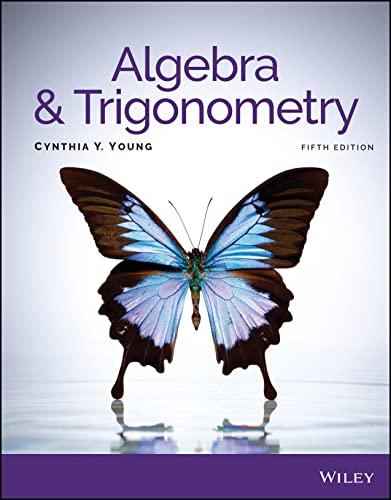Question
Chapter 9, number 9.13 9.13 Given a sample size of 36, how large does the population standard deviation have to be in order for the
- Chapter 9, number 9.13
9.13 Given a sample size of 36, how large does the population standard deviation have to be in order for the standard error to be (a) 1 ? (b) 2 ? (c) 5 ? (d) 100 ?
2.Chapter 10, number 10.10
10.10 Let's assume that, over the years, a paper and pencil test of anxiety yields a mean score of 35 for all incoming college freshmen. We wish to determine whether the scores of a random sample of 20 new freshmen, with a mean of 30 and a standard deviation of 10, can be viewed as coming from this population. Test at the .05 level of significance.
Chapter 11, numbers 11.13
11.13 Reread the problem described in Question 10.5 on page 191. Progress Check *10.5 According to the American Psychological Association, members with a doctorate and a full-time teaching appointment earn, on the average, $82,500 per year, with a standard deviation of $6,000. An investigator wishes to determine whether $82,500 is also the mean salary for all female members with a doctorate and a full-time teaching appointment. Salaries are obtained for a random sample of 100 women from this population, and the mean salary equals $80,100.
(a) What form should H0 and H1 take if the investigator is concerned only about salary discrimination against female members? (b) If this hypothesis test supports the conclusion of salary discrimination against female members, a costly class-action suit will be initiated against American colleges and universities. Under these circumstances, do you recommend using the .05 or the .01 level of significance? Why
Number 11.19 How should a projected hypothesis test be modified if you're particularly concerned about (a) the type I error? (b) the type II error?
Chapter 12, number 12.8 In Review Question 11.12 on page 218, instead of testing a hypothesis, you might prefer to construct a confidence interval for the mean weight of all 2-pound boxes of candy during a recent production shift. (a) Given a population standard deviation of .30 ounces and a sample mean weight of 33.09 ounces for a random sample of 36 candy boxes, construct a 95 percent confidence interval (b) Interpret this interval, given the manufacturer's desire to produce boxes of candy that, on the average, exceed 32 ounces. Review Question 11.12 A production line at a candy plant is designed to yield 2-pound boxes of assorted candies whose weights in fact follow a normal distribution with a mean of 33 ounces and a standard deviation of .30 ounces. A random sample of 36 boxes from the production of the most recent shift reveals a mean weight of 33.09 ounces. (Incidentally, if you think about it, this is an exception to the usual situation where the investigator hopes to reject the null hypothesis.)
Step by Step Solution
There are 3 Steps involved in it
Step: 1

Get Instant Access to Expert-Tailored Solutions
See step-by-step solutions with expert insights and AI powered tools for academic success
Step: 2

Step: 3

Ace Your Homework with AI
Get the answers you need in no time with our AI-driven, step-by-step assistance
Get Started


